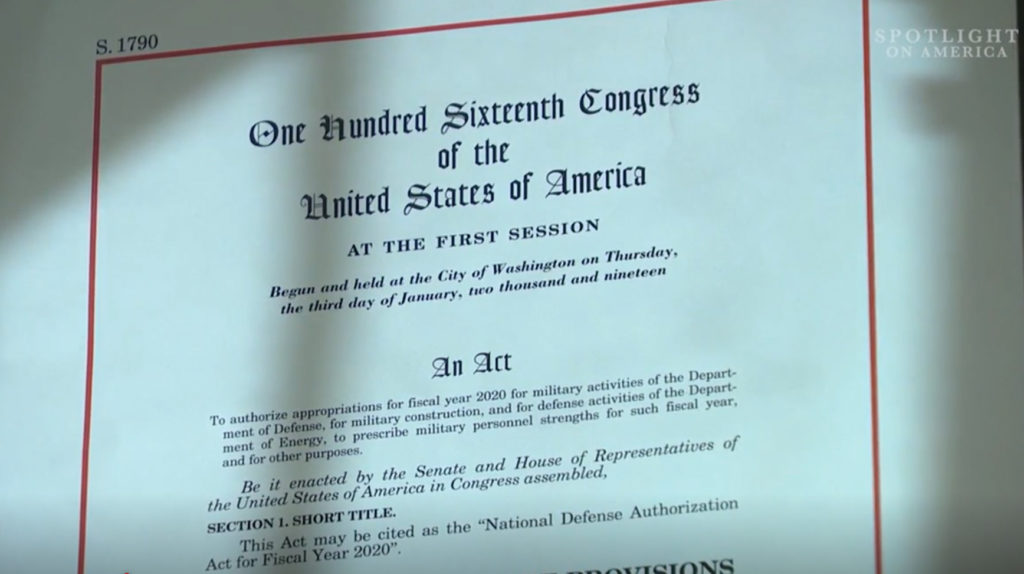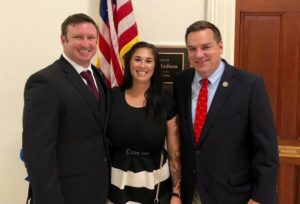On the wall of Suzanne and Dana Way’s Maryland home hangs a massive picture of their son, Jordan enjoying his favorite pastime: fishing. The framed photo is flanked by a copy of Congressional legislation signed by President Donald Trump just 10 months ago. When Suzanne looks at it, she told us, “In the beginning I saw my son saying, ‘Mom, you did it. You heard me’. Now I look at the papers and I’m angry. I’m angry.”
The Way family is angry that a federal law that was supposed to help service members victimized by medical malpractice, hasn’t been enforced. It’s something they’ve battled since Jordan, a Navy Hospital Corpsman, died following routine shoulder surgery at a California military hospital in 2017. Records obtained as part of a 2019 Spotlight on America investigation show he was prescribed increasingly large doses of painkillers as his blood sugar dropped critically low. Jordan Way’s cause of death was officially listed as opioid toxicity.
“There isn’t a day that goes by that you don’t shed a tear, that you don’t have mourning,” said Dana Way. “You see things that happen in other people’s lives and it brings back that whole wash of emotions and grief. Somebody needs to be held accountable for the loss of our son.”
Military families like the Way’s have previously been prevented from seeking accountability through the courts. A decades old court decision known as the Feres Doctrine has made it nearly impossible to sue the military for medical malpractice. But last year, Congress changed that. An amendment in the National Defense Authorization Act, NDAA, passed this past December was supposed to provide a pathway for victims of military medical practice to seek compensation through an administrative claims process. At the time Senator Jim Inhofe, R-Iowa, said, “Everyone involved in this conference, including the Department of Defense, recognized the importance of fixing the medical malpractice issue in a commonsense fashion.”
But the DoD is still working on the regulations for how the claims process will work, so claims filed by dozens have families have gotten no response. Dana Way tells Spotlight on America the lack of action is heartbreakingly frustrating, “It feels just like when he passed away.”
Jordan Way’s claim was filed by attorney Natalie Khawam, who has championed the cause on behalf of service members for years, taking the issue to Capitol Hill. An individual bill named in honor of one of her other clients, Sergeant Richard Stayskal, didn’t succeed in Congress. But the Green Beret’s powerful testimony to Congress about how a missed cancer diagnosis left him with terminal lung cancer, was enough to sway lawmakers to add a provision to the NDAA allowing service members to seek compensation.
Khawam tells Spotlight on America her firm has already filed more than 75 claims with the DoD, including more than 60 malpractice and 14 wrongful death cases. Almost a year after the law was passed by Congress, she says there’s been no response from the military on any of them. A Department of Defense spokeswoman told us, “The Department is currently in the process of developing an interim final rule to implement the processing of claims, which allows Service members to file medical malpractice claims under certain circumstances. The Department is currently receiving claims and these claims will be processed when procedures for reviewing the claims are established.”
“To me, the frustration is is watching the military and the DoD continue to get away with just pushing the marker out. We need more time, we need more time. How much time does it take to create a process that is already in the civilian world,” Dana Way asked.
Suzanne echoed her husband’s frustration. She explained, “Congress did their job. They heard the people. The people said make this happen. Is Congress going to hold the Department of Defense accountable? Because they’re absolutely not doing what they have been told, mandated to do. They failed me. They failed my son.”
The Department of Defense wouldn’t reveal how many claims have been filed for medical malpractice, or if it has answered any of them. But members of Congress may soon hear more about the scope of the military’s malpractice problem. A Government Accountability Office report related to military healthcare is due by the first of the year.
“What we’re fighting for is for my Jordan. For your Jordan. Their life means something,” said Suzanne Way.
For now, those impacted by unthinkable medical mishaps are hoping their collective claims will send a message that action is needed.
“Nobody wants the money. The money never brings your child back. It’s always about accountability,” said Dana Way.
Original Article:
https://local12.com/news/nation-world/despite-change-from-congress-military-malpractice-claims-have-gone-unanswered-suzanne-dana-way

 Call Now- Open 24/7
Call Now- Open 24/7





